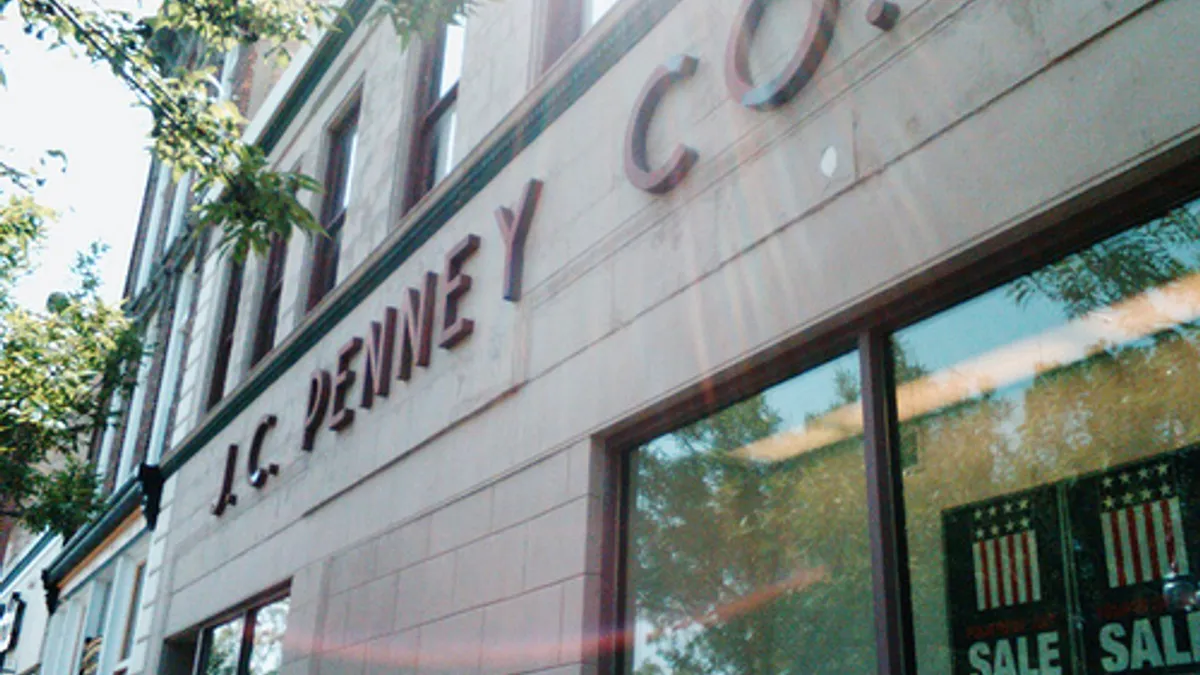UPDATE: May 11, 2020: J.C. Penney has missed another payment on its debt, this one a $17 million interest payment on its senior secured loan facility due May 7, the company disclosed last week. Penney has a grace period of five days before it is in default, which the retailer said it is using "to evaluate certain strategic alternatives, none of which have been implemented at this time."
Reuters reported Friday that Penney could file for bankruptcy as soon as this week with plans to close around 200 stores.
Dive Brief:
- J.C. Penney missed an interest payment on its senior notes that was due Wednesday, the retailer said in a securities filing.
- The company said it "elected" not to make the roughly $12 million payment, which puts Penney into a 30-day grace period. It did so, "in order to evaluate certain strategic alternatives, none of which have been implemented at this time," Penney said in the filing.
- Reuters reported earlier this week that Penney was considering a possible bankruptcy filing as it tries to manage its hefty debt load amid temporary store closures and the unprecedented COVID-19 pandemic and economic fallout.
Dive Insight:
J.C. Penney has touted its ample liquidity to skittish investors in the past months of bankruptcy speculation. The company ended fiscal 2019 with $1.8 billion in liquidity. In the short term, in a normal world, that might have been enough to assuage many fearful investors, an assurance that the company was safe from an immediate Chapter 11 filing.
But the world is no longer normal. J.C. Penney, like scores of other major discretionary retailers, has temporarily closed its entire store fleet as part of the effort to slow the spread of COVID-19. That has brought its revenue from stores to zero. For Penney, its roughly 850 stores account for more than 80% of sales. Many analysts expect store sales from this period to evaporate for retailers generally, not to be made up by online sales.
To free up and hold on to cash, J.C. Penney has furloughed staff, drawn on its revolver, extended vendor payments and canceled orders. Cowen analysts most recently estimated that Penney has enough liquidity to weather eight months of closures and major sales disruption.
The retailer is in survival mode in a year that was supposed to be spent revamping stores that had lost their appeal for many customers, as well as merchandising that has in the past missed its target.
Penney's turnaround is on ice, to put it simply. And it badly needed a turnaround before the pandemic overturned the retail world. Sales were in a perpetual state of decline leading to widening losses even as CEO Jill Soltau's team made some improvements on slashing inventory to reduce discounting.
Moody's this week downgraded J.C. Penney yet deeper into junk territory. According to Moody's estimates, Penney's EBITDA could decline more than 80% in fiscal 2020 before recovering, slowly, in 2021.
"As a result, J.C. Penney's leverage will remain at unsustainably high levels over the next two years," Moody's analysts said. "In addition, the company's work to define and execute its strategy to return to stabilizing its market position and improving profitability will be difficult in the current operating environment."
Reuters reported this week that, after months of speculation, Penney might file for bankruptcy protection to get debt relief and rework its "unsustainable finances." The news service also reported that Penney was talking with lenders about a possible out of court deal.
The missed interest payment could be a prelude to either outcome. The pandemic has already claimed True Religion, which filed for its second Chapter 11 this week, seeking new financing and court protection from rent payments. Experts expect many more bankruptcies to come, as closures, recession and customers wary of leaving the house combine to knock out the weakest, most leveraged retailers.
In a worst-case scenario, were J.C. Penney to liquidate entirely, Kohl's could be a benefactor, according to Credit Suisse analysts led by Michael Binetti. But according to Binetti's team, off-price retailers would be the biggest winners.
















